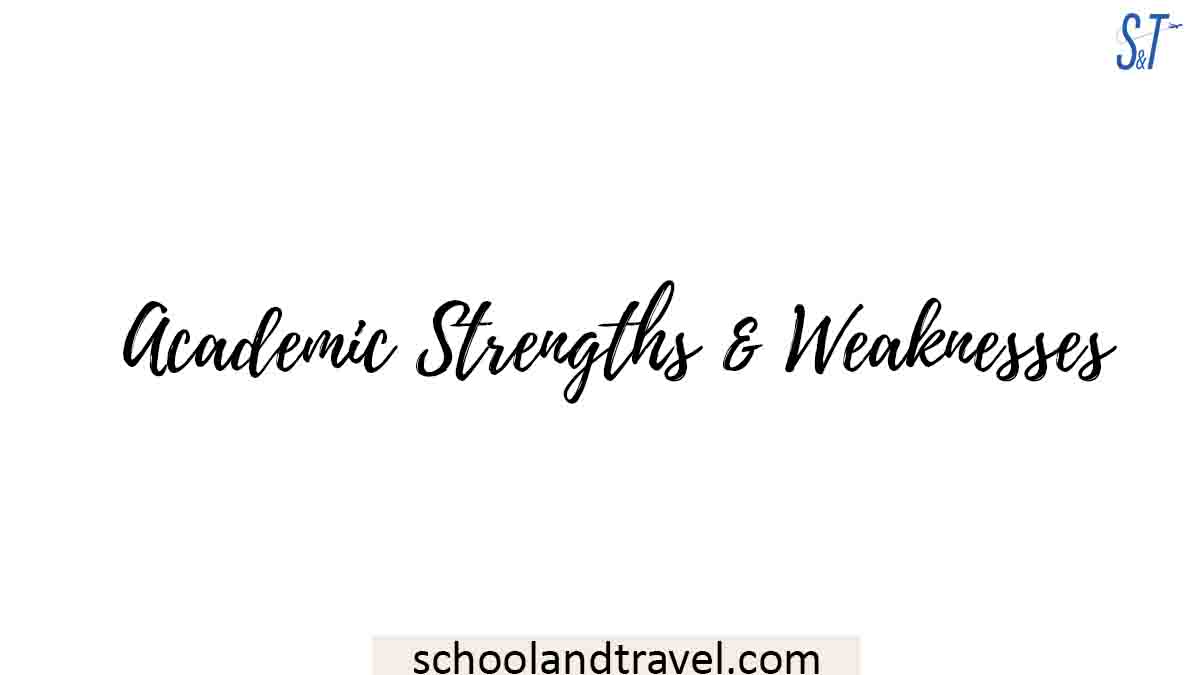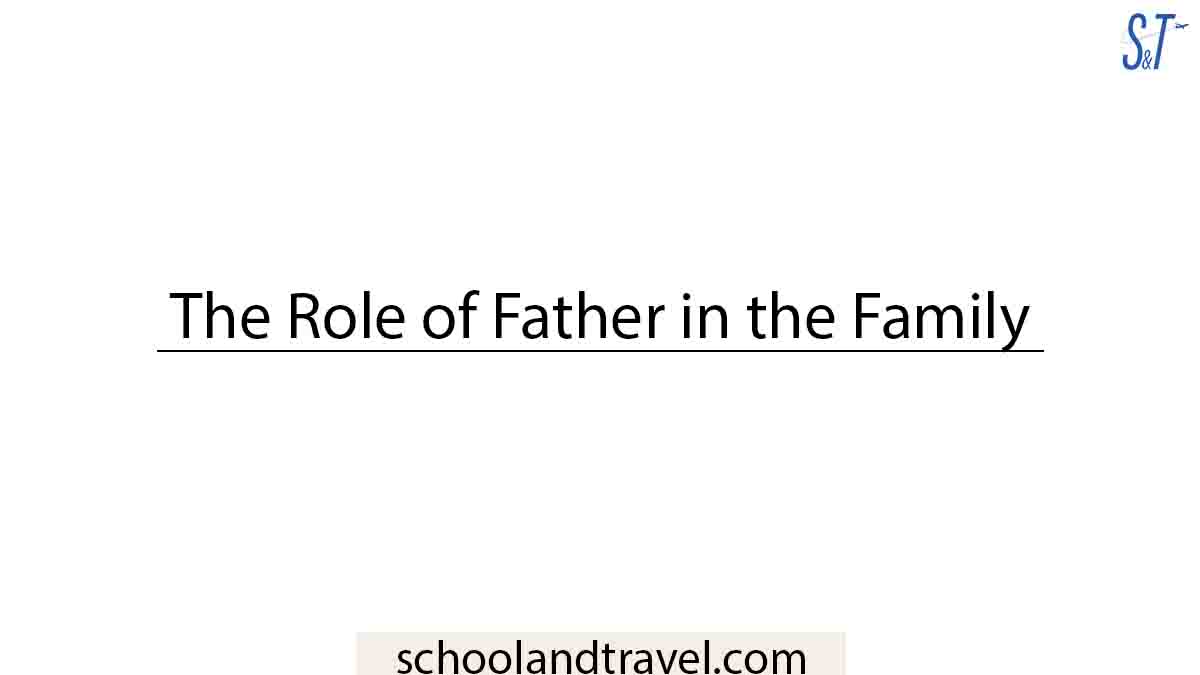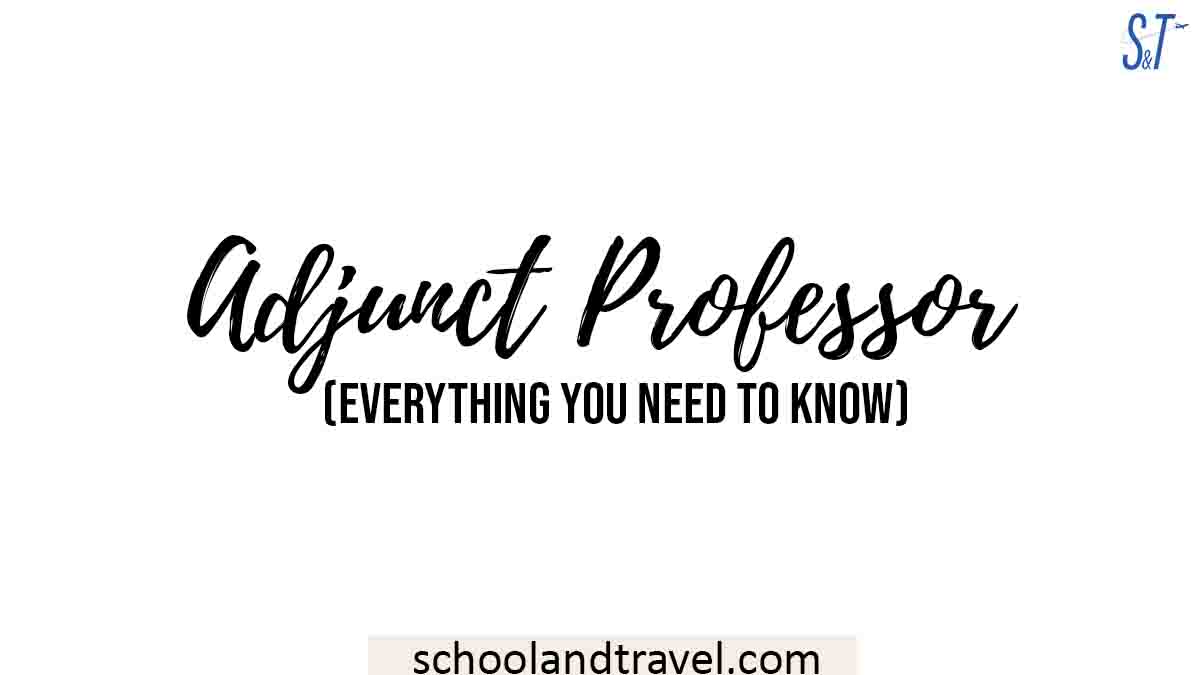Academic Strengths and Weaknesses: The academic strengths and academic weaknesses list shows what a student can do and improve upon.
Everyone has strengths and weaknesses, and some can be developed over time.
Have you been asked about your academic strengths and weaknesses?
What was your answer? It’s good to identify your strengths and weaknesses so that you can know where to improve or even work on them.
This article explains the following:
- Strengths and Weaknesses of a student
- Academic Strengths and Weaknesses List
- Child academic strengths and weaknesses examples
- School strengths and weaknesses
- Strengths and Weaknesses in school
What does “academic” mean in education?
The term “academic” refers to work done in schools, colleges, and universities, particularly work that includes learning and reasoning rather than practical or technical abilities.
What is an academic career?
Academic Career refers to any level of study at the Higher Education level, including undergraduate, postgraduate by coursework, postgraduate by research, and non-award.
It refers to aggregating all academic work completed by a student under a single student record.
Being a student enables individuals to acquire educational, scholastic, and theoretical knowledge skills.
Academic learning has emphasized the practical traits and ideals of uniqueness and competition within the prevailing system.
What is academic time?
A student’s academic learning time (ALT) is the total amount of time they spend actively, successfully, and profitably learning relevant academic material. This term is often used in place of the more specific term “student involvement.”

What are Academic Strengths:
Academic strengths are character traits that make you exceptional from others in a learning environment.
The academic strengths are inbound in you and are shown when you are in competition or when you have to show how good you are in a particular learning field.
For instance, a child’s academic strength in Math can be knowing the multiplication table, addition, and subtraction in class.
On the other hand, in our daily life, a child’s academic strengths can be honesty, self-respect, and talents that make that child exceptional in his or her way.
30 Students’ strengths and weaknesses list and Meaning:
These are the top strengths and weaknesses of a student:
1. Taking Corrections:
This has to do with the ability to accept mistakes when corrected. The mistake can be from you or someone else; all that matters or follows is that you took correction from a mistake.
2. Discipline:
Discipline is the technique of teaching people to follow the rules or a code of behavior through punishment to enforce compliance.
More so, it is the strength of doing the right thing at the right time.
3. Problem Solving:
Problem-solving is the process of resolving challenging or complex problems. It includes the ability to find a solution to problems even under pressure. You can solve your academic problems with studycrumb.
4. Leadership skills:
The act of guiding a group of people or an organization is leadership. The ability to lead people forward, make progress, and replicate other leaders.
5. Being Kind and friendly:
Being friendly entails interacting with others pleasantly and pleasantly.
It entails projecting a positive image and being a pleasant person to interact with. Kindness suggests a level of genuineness that friendliness does not.
6. Honesty:
Honesty is the attribute of being honest. Moreover, it is the ability to defend the truth even under pressure.
For an individual to be honest, they must both speak and act truthfully. This can aid students in having open and honest conversations, establishing healthy boundaries, and forming lasting friendships.
7. Kindness:
Kindness can be defined as the attribute of being friendly, generous, and caring toward others.
Children benefit greatly from acts of kindness because they raise serotonin levels, a hormone that regulates how one feels about oneself.
This crucial chemical plays a role in many important processes, including cognition, emotion, sleep, and even digestion and health.
8. Creativity:
Creativity is defined as the tendency to develop or recognize ideas, alternatives, or possibilities that may be beneficial in resolving issues, interacting with others, or entertaining ourselves and others.
9. Critical thinking:
Critical thinking is the intellectually disciplined process of conceiving, applying, analyzing, synthesizing, and evaluating evidence gleaned from, or generated by, observation, experience, reflection, reasoning, or communication to inform one’s beliefs and actions.
10. Ability to sit down and read:
It involves joining a book club or using ebook ghostwriting services, making sure the books are readily available, taking the chapters one at a time, taking rest when necessary, and reflecting on what you read.
11. Open-mindedness:
Being open-minded entails being responsive to various concepts, arguments, and facts.
Being receptive is often regarded as a favorable trait.
12. Dealing with criticism:
This is how the child reacts when being criticized by a peer or on something h/she is not good at. The academic Strengths in this context are handling criticism and improving effectiveness.
13. Coding:
The world has turned around, with basically everything online.
Thus if you can code software to solve a definite problem, it can be one of your academic Strengths that sets you aside from others.
14. Language:
The ability to speak fluently is one of the major academic Strengths of an individual.
If you build your language and communication skills properly, you will be valued, and everyone will love to hear you speak.
15. Story Telling:
Storytelling skills can’t be overemphasized. It’s one of the major academic Strengths that takes time and commitment to groom.
When groomed will take you places beyond your expectation. To tell a story is a social and cultural activity, and it can be a dramatic performance in and of itself.
Whether for amusement, instruction, historical record-keeping, or moral indoctrination, every culture has its own stories or narratives.
16. Self Discipline:
This is the ability to do the right thing at the right time. If you have the self-discipline to study without procrastination (one of the major academic weaknesses), you will grow in your academic strengths in school.
More so, self discipline is the ability to exercise self-control and motivate oneself to work diligently or act in a certain way without external reinforcement or direction is the essence of self-discipline.
17. Time Management:
The ability to keep time and follow the schedule will go a long way in building your reputation and being known as one that keeps time.
Making the most of each day is the essence of effective time management for students (and everyone else).
Managing one’s time well entails prioritizing activities to achieve a state of equilibrium in which one can concentrate, get things done, and enjoy life.
It’s a great tool for combating the procrastination-inducing sloth. If you manage your time well, you’ll have time to find information or seek for assistance before diving in headfirst.
The inability to begin a task due to a lack of confidence is a typical cause of procrastination among students.
18. Socialization:
Socialization is the process that begins in childhood and continues throughout life in which individuals learn a society’s values, habits, and attitudes.
However, dealing with shame and its boundaries becomes a continual aspect of a child’s socialization, as norms and rules are everywhere.
19. Collaboration:
The ability to collaborate is one of the major academic Strengths that gives you an edge over others in a workplace.
The phrase “collaborative learning” is used to describe a wide range of strategies used in the classroom to encourage students and teachers to work together on a common intellectual goal.
This form of learning, in which classes are divided into smaller groups to solve problems, complete assignments, and gain knowledge from one another, has emerged as one of the most prominent pedagogical tenets in use today.
Read more:
- Do Medical Students Get Paid? (FAQs, Online Money)
- How To Get Paid To Be An Online Girlfriend (Websites, Tips, FAQs)
- How to Get Paid to Watch Hallmark Movies ($1000)
- How the Internet aids Students’ Academic Success
- 5+ Schools Offering Work-Study Programs In Canada
20. Planning skills:
Planning is the process of considering the activities necessary to accomplish a goal. It is predicated on foresight, the fundamental mental ability to journey across time.
When you take the time to prepare and organize your work, you can complete it more efficiently and with fewer errors.
You may increase your productivity and efficiency by planning and organizing your work. You can get a lot done if you set your priorities straight and make detailed plans on how to get there.
21. Prioritization:
Prioritization is putting things or actions in order of how important they are compared to each other.
In the context of medical evaluation, this is figuring out the important or urgent actions that need to be taken to keep a client or patient safe.
Academic Strengths and weaknesses: What are Academic Weaknesses?
Academic weaknesses are the downsides. Just like we are not perfect as human beings, we have weaknesses.
Your Academic weaknesses are things you find challenging to do that you love to correct or change.
Top 11 Academic weaknesses list:
1. Procrastination:
Procrastination is the deliberate delay or postponement of duties until the last minute or after the deadline has passed.
Some academics say procrastination is a “type of self-regulation failure marked by the unreasonable postponing of tasks despite possible negative repercussions.”
2. Stubbornness:
Stubbornness is the persistent refusal to alter one’s attitude or viewpoint on something. One who is stubborn is unwilling to budge from his or her current point of view or way of life.
3. Impatience:
Impatience is the sensation of being irritated by someone else’s errors or by the necessity of waiting. It is also the desire for something to occur immediately.
4. Indiscipline:
Indiscipline is when individuals lack control over their behavior and disobey rules. However, disobedience to established rules and standards is considered indiscreet.
The disruption of the school’s normal, orderly operation directly results from this infraction of the norms and regulations that govern it.
5. Intolerance:
Intolerance is the refusal to accept alternative viewpoints, beliefs, or behaviors.
Tolerance is a show of strength, not weakness, and intolerance is unacceptable in any form.
Sincere tolerance requires interrogation, interest, and conversation. Learning and comprehension are necessary companions.
One of the most effective means of combating intolerance is receiving a good education, which can help people see the commonalities they have with others while also encouraging a healthy appreciation for their differences.
6. Aggression:
Aggression is social involvement with the intent of causing physical or psychological harm to another person; but, for others, it can be channeled into creative and practical outlets.
7. Dullness:
Dullness lacks intelligence or mental sharpness, sluggishness, stupidity, heaviness, and dim-wittedness.
8. Being Blunt:
Speaking directly or rudely. You may be direct without also coming out as inconsiderate.
A person is deemed inconsiderate if, in order to make a point, he tramples over the feelings of others and makes them feel worthless, whereas bluntness refers to being abrupt and to the point without hurting anyone’s feelings.
9. Talkative:
Talkative is a term used to describe someone who frequently speaks without meaning.
A child who tends to chatter on and on for no apparent reason is described as talkative, which can be seen as either neutral or moderately negative.
10. Lack of Focus:
Students with a short attention span find it difficult to focus on the subject at hand. They are susceptible to being distracted by their immediate environment.
This weakness presents itself in zoning out during lectures, losing focus by failing to finish given work, excessive sleep, or having a preference for partying over studying.
11. Lacking interest:
Numerous causes might contribute to a lack of interest, including concentration challenges, family issues, emotional difficulties, and learning disabilities.
Sometimes it’s simply simple boredom; it’s not always about having fun. Students do not value the course or its material.
Students are skeptical that their efforts will improve their academic success. The form and distribution of rewards discourage student motivation. Students do not perceive a helpful classroom climate.
Read more:
- Understanding Academic Weaknesses (70 Examples, Solution)
- Understanding Academic Strengths (59+ Examples, Tips)
- Academic Interests: How to quickly develop one (Fast)
- Is Capital Goods a Good Career Path? (Meaning, Jobs, FAQs)
- 5 Easiest Languages to Learn for English Speakers (FAQs)
- 10 Low-stress Jobs that Pay Well Without a Degree (Meaning, FAQs)
How can I identify my academic Strengths and Weaknesses:
Identifying your strengths and weaknesses helps to improve your academic performance and your life in general.
You can use the following steps to identify your strengths and weaknesses:
1. Evaluate yourself sincerely:
Before seeking opinions from people, spend some time alone evaluating yourself. Create separate lists of strengths and weaknesses you think you have.
When listing them out, be honest and objective.
Don’t downplay nor exaggerate your abilities, and neither should you beat yourself up over your flaws. Just state them as they are.
For example, if you are an avid reader, state that. If you aren’t good at math, state it.
If you find the whole process somewhat tricky, you can ask yourself questions like:
- What are my interests?
- What am I passionate about?
- What tasks can I perform for hours on end without feeling exhausted?
- What chores do I perform that drain and fatigue me?
You can also state your learning style; how best you learn and understand the information passed on.
Are you a visual learner (learn by sight) or are you an auditory learner (learn by hearing), or are you a tactile learner (learn by touch)?
This will help take note of your learning style and ensure you utilize your learning process.
2. Talk to someone you trust:
Seeking an opinion or talking to people you trust for feedback about your strengths and weaknesses helps you get an unbiased and clear opinion about yourself.
It removes the problem of you overestimating or underestimating yourself.
However, when seeking an opinion, choose people who have spent ample time with you and have observed your abilities.
They should be honest, trustworthy, and unbiased. They could be your parents, friends, teachers, professors, or even school counselors.
You can compare their responses with your lists, check for significant similarities, or even ask them to review your list and give their thoughts.
More so, you can practice communicating on a site like bazoocam or in speaking clubs. It will help you open up and learn how to present yourself as an intelligent person.
In Summary:
- Find out what naturally flows from you, what you love doing; that’s your strength.
- I know you have friends close to you; yes, they know your academic strengths and academic weaknesses list. Get in contact with them and let them tell you more about it.
Read more:
- Academic Advisor: How to become the best
- 5 Best MBA Without GMAT Schools in Canada (GMAT Adv, FAQs)
- 10 Best Online Colleges That Pay You to Attend (Degrees, FAQs)
- Nursing Schools in Manila (Degrees, Schools FAQs)
- Nursing in France (How to, Nursing Schools, Visa)
- 5 Best Culinary Schools in Pretoria (Duration, Tips, FAQs)
How do I deal with my weakness list:
I have weaknesses just like you. Everyone has a weakness, but you can work every day to improve yourself and work on your weakness. Here are the tips for you:
1. Make a routine to work on your weaknesses:
Please find out your weakness and make out time to work on it.
If your weakness is intolerance, learn how to tolerate people, learn how to take things easy, and focus more on the good side of things than the insecurities.
If you have a weakness in Procrastination, read the book, “Eat that Frog” by Brian Tracy. It will help you reduce procrastination to the last.
Read also: 20+ Fun Things to do in College when bored
If you have any weaknesses, look for a way to tackle them to the last. Everything has a solution.
Read on, on academic strengths and weaknesses;
2. Get a Mentor:
A mentor is someone that has gone ahead of you, made mistakes, created the mistakes, and is still moving on.
If I have seen further than others, it is by standing upon the shoulders of giants.
Isaac Newton
Get a Mentor in the field of your weakness. If you have the weakness of aggressiveness and anger, get a life coach to direct you and help you make some vital decisions to help work on your anger issues.
3. Be Humble:
Be willing to learn from others. Yea, I know that Humility alone is a strength on its own so if you want to boost your academic strengths and reduce your weaknesses list, make up your mind to be willing to learn.
Importance of identifying academic strengths and weaknesses:
1. It creates self-awareness and motivates improvements:
Identifying and evaluating your strengths and weaknesses helps you know what you do best and need to improve.
It helps motivate you, and you become intentional about your efforts and what you want to gain.
2. It builds confidence:
Acknowledging your strengths helps boost your confidence levels. You begin to see things you are capable of, irrespective of your weaknesses, and you begin to appreciate yourself.
Read more: 10 Signs of an Intelligent Person (Meaning, Methods, FAQs)
Academic Strengths for a Job Interview:
When asked, “What is your biggest strength?” it may seem like one of the more straightforward questions you’ll be asked during a job interview.
Candidates sometimes struggle with this because they are either overly modest in their responses or fail to highlight the qualities that are most closely aligned with the job’s criteria.
In order to determine if your strengths match the company’s needs and the job’s duties, interviewers ask this question.
The goal of the interview is to find out if you’re a good fit for the position for which you’re applying. The interviewer’s purpose is to find a match between your qualifications and the skills required to succeed in the position for which you are being interviewed.
You must answer this question to help the company evaluate whether or not you are the best candidate for the position.
This means that if you’re seeking a position in accounting, it’s not a good idea to emphasize your skills in event planning.
How to Answer “What Is Your Greatest Strength?” in an Interview:
Employers are looking for people that have the skills they are looking for.
A person’s resume might include any number of items, including formal and informal education and training and practical and technical abilities acquired via prior employment experiences.
So, the best way to deal with this is to determine which of your abilities are most important to you and focus on them.
More so, include all the impact words in your responses as well to help you establish a positive first impression. Your chances of getting a second interview or a job offer increase if your talents match those specified in the job description.
Read more: 10 Most Popular Jobs that pay $100 an Hour (How-to, FAQs)
4 Major Ways to Improve Academic Performance:
1. Increase your focus in class:
Avoid daydreaming and concentrate on what is occurring in class. Many instructors provide suggestions about the topics that will be covered on their quizzes and exams.
Additionally, you will be able to comprehend the subject being taught, as opposed to returning home and attempting to comprehend the assigned content.
2. Perform adjustments and exercises:
The lack of practice and review is one of the primary causes of lower grades.
Reviewing your notes and reading your books is essential. Additionally, practice examinations are an excellent way to identify your flaws and work on them.
In addition, give yourself sufficient time to rewrite so that you do not feel rushed.
3. Start preparing:
Getting organized is perhaps the best method to better your life in general and your academic life in particular. Create a folder or binder for each subject and place all pertinent documents inside.
It is crucial to maintain your bag clean, so designate one day per week to look through your folders and remove any unnecessary papers.
In addition, begin using your planner for homework due dates, exam dates, and other significant events.
4. Hire a private tutor:
There is no shame in asking for assistance. It can be your older sister, mother, or cousin. However, children often feel awkward or shy with their brothers or cousins.
Therefore, you should employ a tutor who can assist you in comprehending the content, teach you new study habits, and improve your grades.
Many students are unwilling to ask their peers or family members for assistance, therefore, a private tutor may be the solution.
Does Academic growth matter?
A student’s academic advancement is improving their grades from one grading period to the next.
Measuring development can be as simple as comparing a student’s current test score to their previous test score (known as a gain score) or as sophisticated as using a statistical model to account for academic and demographic variability among students.
Future success in technologically demanding occupations will necessitate academic achievement.
More so, excelling in school has a ripple effect on one’s behavior and relationships with friends and family.
School strengths and weaknesses
School strengths:
1. Curiosity:
A curious mind is a valuable trait in a good student. The student will try to go above and beyond what is presented in textbooks and refrain from cramming.
That will prompt them to talk about the material with their instructors and seek additional information on their own, perhaps by consulting books or the web.
2. Organization:
A high level of academic organization is a significant virtue. Students need to establish a methodical study routine that they stick to regularly.
The two of them sit down each morning to plot out their schedule and establish goals for the day. Whether it’s a game, a study session, or a social gathering, they stick to a strict schedule.
School Weaknesses:
1. Procrastination
The most significant obstacle to effective learning is procrastination. Students typically procrastinate till the last minute and divert their attention elsewhere.
Obviously, that will lead to sloppiness and a lot of mistakes. Some kids may succeed academically despite procrastination, but this is not a healthy pattern to maintain.
Even if it doesn’t hurt them right now, it can end up hurting them in the long run when it comes to their grades.
2. The Dread of Defeat:
Some pupils’ inability to perform well can be attributed to their irrational fear of failing. They worry too much, and as a result, their academic performance suffers.
They may still perform poorly on tests even though they put forth a lot of effort because they eventually give in to their nervousness.
What are Academic Goals?
The term “academic goals” refers to aspirations related to furthering one’s education.
Coursework, grades, and co-curricular activities contribute to the sum of knowledge and skills you develop in school.
A college student’s sense of direction can be sharpened by establishing specific academic objectives.
In addition, it may guide your efforts by showing you where to put your time and effort to get the best results.
A long-term objective will take more than a few weeks to complete or maybe even an entire academic semester. To raise a grade by the semester’s end is one such goal.
How to Measure Your SMART Goals
1. Talk to other people who share your ambitions
Having a group of encouraging people behind you may do wonders for your motivation.
After deciding what you want to accomplish, identify someone, you can rely on to keep you on track. Somebody you know and care for, whether they’re personal or professional.
Give back by offering to assist them in keeping tabs on their development aspirations.
2. Write It Down:
Writing down your accomplishments is a great way to keep yourself accountable as you work toward a goal.
Take the time to record your accomplishments and plan your next moves at each milestone. You can update a close buddy on your progress or post it online.
Stability in Building Academic Strengths and Weaknesses:
To ensure a child’s academic stability, he or she should remain enrolled in his or her home school until it is determined that doing so is not in the child’s best interest.
If this is the case, the child should be enrolled in the resident school immediately, and all school records should be requested and transferred.
On the other hand, as adults, you can improve your employment prospects and expand your horizons by furthering your education and earning a bachelor’s or higher degree.
As if that weren’t enough, a good education can guarantee a comfortable income in today’s world.
More so, getting an excellent education helps you acquire the knowledge and skills you need to succeed in your career and increases your chances of landing a higher-paying job.
Those with a good education and a lot of life experience know how to cut costs wherever possible.
Frequently Asked Questions on Academic Strengths and Weaknesses:
Academic skills refer to the abilities, strategies, and habits that enable students to succeed academically. They typically build on students’ literacy and technical subject mastery, such as mathematics and science.
An intellectually strong person constantly expands his or her knowledge base and applies it in real-world situations. Intelligence refers to one’s ability in math, art, science, or any other subject. A person must engage in activities that challenge his intellect to build intellectual strength.
To be morally strong, a person must be able to control their strong, yet irrational, desires while still knowing the right thing to do.
Some academic strengths students have are curiosity, creativity, time management, delayed gratification, and impulse control. Skills like critical thinking and problem-solving can be applied to knowledge-based careers.
Academic weaknesses are drawbacks that an individual may encounter during learning. These can include abilities, skills, experience, knowledge, and personality qualities. Academic deficiencies may be discovered during the admissions process or after a study of a student’s learning objectives and progress.
It has been argued that students’ lack of discipline has a negative impact on their schoolwork because it makes it harder for them to pay attention in class, causes them to miss lessons, and ultimately hinders their ability to learn the material.
Conclusion on the academic strengths and weaknesses:
Your academic strengths and weaknesses can be what you know/What you don’t know, your teachable skills, and your lifestyle.
You can grow your weaknesses and strengths academically and will do well.
Awesome one; I hope this article answered your question very well.
Share this Information.
Editor’s Recommendations:
- Social Strengths and Weaknesses (Everything you need)
- 15+ Most Popular Hobbies for Women in their 20s in 2023
- Top 5+ Random Hobby Generator
- Transcript for Scholarship Applications (Expert Research and tips)
- 13 Best Buckinghamshire Grammar Schools
- Top 20 Acupuncture schools in the World | USA | 2023
- Top 13 Best Culinary Schools in France
- Self-Plagiarism in College (Meaning, Charges, Dos & Donts)
- What is the Dean’s List? (Meaning, How to, Benefits, FAQs)
- How do Radio Stations Make Money? (Step by Step, Promotion)
- How to Get Paid to Watch Hallmark Movies ($1000)
- Top 10 Best Colleges in Jacksonville
- How to Make Money Watching Netflix in 2023 (Full Research)
- How do Churches make money? | $5k -$1m
- How To Get A Person Fired (Step by Step)
- How Much Money is in an ATM? (Maximum, Loading, Limits)
- Colleges that don’t require Supplemental Essays | 2023
- Should I bring my console to College? (Best & Quick Answer)







Comments are closed.